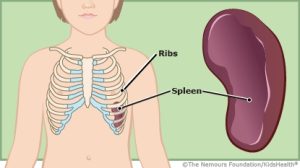10 Spleen Problems – When to Worry, and When to See a Doctor

Problems with the spleen are rare.
the spleen is a highly specialised and important organ that plays a critical role in the body’s immune system, and removal and storage of blood. But what does the spleen do? It has 3 main functions:
- Blood filter – the spleen filters and removes old or damaged red blood cells (as well as other foreign particles, such as bacteria and viruses)
- Blood reservoir
- Antibody production.
Here are 10 spleen problems, their symptoms, when to worry, and when to see a doctor:
1. Enlarged Spleen (Splenomegaly)
- What it is: A condition where the spleen becomes larger than normal. It has many causes, including portal hypertension (usually part of chronic liver cirrhosis), part of a whole body blood or lymphatic cancer, or some long-term causes of anaemia.
- Symptoms: Pain or discomfort in the upper left abdomen, feeling full without eating, fatigue.
- When to worry: Persistent abdominal pain or discomfort.
- When to see a doctor: Consult a doctor if symptoms persist or worsen over time.
2. Splenic Rupture
- What it is: A life-threatening condition where the spleen tears or bursts.
- Symptoms: Severe abdominal pain, tenderness, nausea, vomiting, dizziness.
- When to worry: Severe abdominal pain or trauma to the abdomen.
- When to see a doctor: Seek immediate medical attention if symptoms occur.
3. Splenic Infection
- What it is: An infection that affects the spleen, often caused by bacteria or viruses.
- Symptoms: Fever, chills, abdominal pain, fatigue.
- When to worry: Persistent fever or abdominal pain.
- When to see a doctor: Consult a doctor if symptoms persist or worsen over time.
4. Splenic Abscess
- What it is: A collection of pus that forms in the spleen.
- Symptoms: Fever, chills, abdominal pain, fatigue.
- When to worry: Persistent fever or abdominal pain.
- When to see a doctor: Seek immediate medical attention if symptoms occur.
5. Splenic Infarction
- What it is: A condition where the spleen’s blood supply is blocked, causing tissue death.
- Symptoms: Severe abdominal pain, nausea, vomiting.
- When to worry: Severe abdominal pain or trauma to the abdomen.
- When to see a doctor: Seek immediate medical attention if symptoms occur.
6. Splenic Cysts
- What it is: Fluid-filled sacs that form in the spleen.
- Symptoms: Abdominal pain, discomfort, feeling full without eating.
- When to worry: Persistent abdominal pain or discomfort.
- When to see a doctor: Consult a doctor if symptoms persist or worsen over time.
7. Spleen Cancer
- What it is: A rare type of cancer that affects the spleen. When cancer affects the spleen it is usually part of a whole body blood or lymphatic cancer, like a chronic leukaemia. Not all are serious.
- Symptoms: Abdominal pain, fatigue, weight loss.
- When to worry: Persistent abdominal pain or unexplained weight loss.
- When to see a doctor: Consult a doctor if symptoms persist or worsen over time.
8. Spleen Damage from Trauma
- What it is: A condition where the spleen is injured due to trauma or injury.
- Symptoms: Severe abdominal pain, tenderness, nausea, vomiting.
- When to worry: Severe abdominal pain or trauma to the abdomen.
- When to see a doctor: Seek immediate medical attention if symptoms occur.
9. Autosplenectomy
- What it is: A condition where the spleen is damaged and loses its function.
- Symptoms: Increased risk of infections, fatigue.
- When to worry: Persistent fatigue or increased risk of infections.
- When to see a doctor: Consult a doctor if symptoms persist or worsen over time.
10. Hyposplenism
- What it is: A condition where the spleen doesn’t function properly.
- Symptoms: Increased risk of infections, fatigue.
- When to worry: Persistent fatigue or increased risk of infections.
- When to see a doctor: Consult a doctor if symptoms persist or worsen over time.

